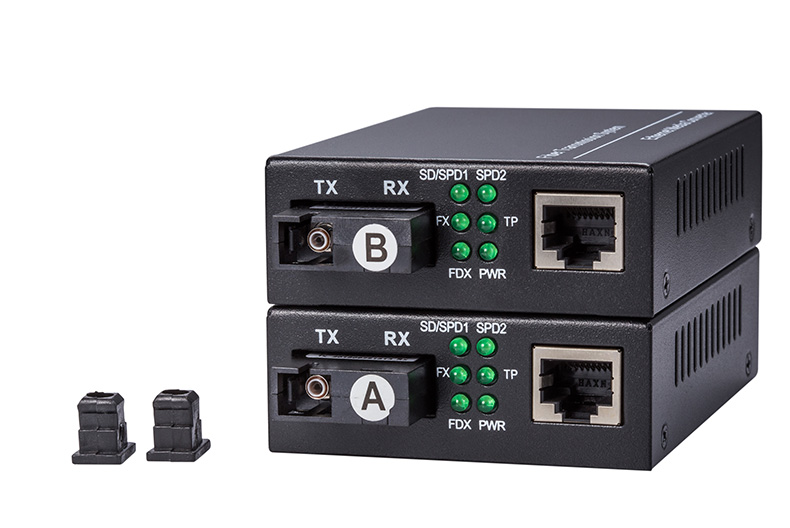Welcome!

Media converter also called as fiber converter which receives data signals, sends via one media, converts the signals and then transmits the signals into another kind of media. Fiber converters can convert the signals sent from copper cable to signals that run on the fiber cable. Fiber media converters are used in the fiber optic network to transform the signals sent from fiber glass to traditional UTP cables; they are typically used in Ethernet as physical layer networking equipment.
Key Features
Support 1 1000Base-FX fiber port and 1 10/100/1000Base-TX Ethernet port.
Support IEEE802.3, IEEE802.3u fast Ethernet.
Full and half duplex communication.
Plug and play.
Easy to read LED indicators.
Includes external 5VDC power supply.
Parameter
Specifications
Access mode
10/100/1000Mbps Gigabit Ethernet
Standard
IEEE802.3ab 1000Base-T , IEEE802.3z 1000Base-SX/LX Gigabit thernet,IEEE802.1qVLAN,IEEE802.1p QoS,IEEE802.1d Spanning Tree
Wavelength
850nm/1310nm/1550nm
Transmission distance
Dual-fiber multi-mode: 220m (62.5/125μm)/550m (50/125μm)
Dual-fiber single-mode: 25/40/60/80Km
Single-fiber single-mode: 25/40Km
Category-5 twisted pair: 100m
Port
One RJ45 connector: connected to STP/UTP category-5 twisted pair
One fiber port: Multi-mode SC (fiber size: 50,62.5/125µm)
Single mode SC/FC (fiber size: 9/125µm)
Conversion means
Media conversion
Delay
<10us
BER
<10-9
MTBF
100,000 hours
LED
PWR (power supply), FX LINK (optical link action), TP LINK1000 (twisted pair link1000M), TP LINK100 (twisted pair link 100M), TP ACT (twisted pair packet forwarding)
Power
AC220 0.5A/DC-48 (built-in)
Power consumption
5W
Operating temperature
-10~55ºC
Operating humidity
5%~90%
Maintaining temperature
-40~70ºC
Maintaining humidity
5% ~ 90% non-condensing
Dimensions
26mm (H) * 70mm (W) * 94 mm (D) (external power supply)
30mm (H) * 110mm (W) * 140 mm (D) (internal power supply)